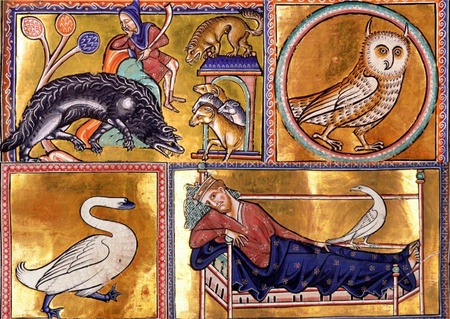The Aberdeen Bestiary, one of the most beautiful examples of its kind in the world, has left the UK for the first time since its creation more than 800 years ago to take centre stage at an exhibition in Los Angeles.
As many as 150,000 people are expected to visit Book of Beasts: The Bestiary in the Medieval World, which has launched at the J. Paul Getty Museum Los Angeles.
The exhibition is hosting 115 loans from 45 institutions in Europe and the US, including one third of the world’s Latin illuminated bestiaries. It will run until August 18.
The bestiary is a vibrant and fascinating medieval book, which describes the beasts of the world, both real and fantastical, as well as birds and even rocks, bringing them to life for readers. Vividly imagined, the beasts often ‘escaped’ from manuscripts to inhabit other art works made during the medieval period, and even up to the present day.
Bestiaries were popular in the 12th and 13th centuries and used to provide Christian moral messages, but few were produced to the high standard of the Aberdeen manuscript, which is considered one of the best examples of its type due to its lavish and costly illuminations.
The book was created in England in around 1200, and first documented in the Royal Library at Westminster Palace in 1542. Once belonging to Henry VIII, it has been in the care of the University since 1625, when it was bequeathed to the University’s Marischal College by Thomas Reid, a former regent of the College and founder of the first public reference library in Scotland.
Its rare and fragile nature means it must be protected from the light and can rarely be displayed to the public.
Beth Morrison, Senior Curator of Manuscripts at the J. Paul Getty Museum, said: “The Aberdeen Bestiary is, of course, one of the most famous due to its beauty. When I asked Aberdeen for the loan, I received a very warm welcome - they were excited about the breadth and ambition of the exhibition and understood the important role it could play.
“The Getty is honoured to host the Aberdeen Bestiary in its first journey outside the UK since its creation over 800 years ago. To see it in the context of other bestiaries and related works of art will help us to understand its greater role in the visual arts of the Middle Ages and its artistic legacy.”
Liz Bowie, Director of Development and Alumni Relations, said that Aberdeen's Professor Jane Geddes had led the scholarly study of the bestiary and was delighted to see it displayed in this spectacular exhibition.
“It is wonderful to see this project come to fruition after years of hard work. We are delighted to have our bestiary featured prominently in this exhibition where so many people, including our alumni, will be able to share one of the many treasures of the University of Aberdeen’s special collections.”


